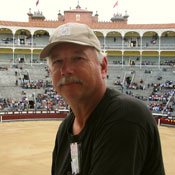Wednesday, January 4, 2017
Something wasn't quite right. My family and friends had already entered the cathedral to have a look around, but the wall in front of the cemetery held my attention.
We were in the French city of Obernai, a beautiful little Alsatian village a few miles from where I live in Strasbourg, France. The city has an intact wall complete with turrets, gates, a moat, modern apartments and even a hotel. It has winding narrow cobblestone streets, and at every other door, you can taste the fruits of the thousands of acres of nearby vineyards. Ruined castles dot the hillsides and poke jaggedly against the skyline. On this wall, like in almost every city that I've ever been, there are memorials to their wartime dead. Here, bronze plaques honor the Obernai soldiers who died in service to their country, beginning with the 1870-1871 Franco-Prussian war, followed by a longer WWI plaque and an even longer WWII plaque.
I suddenly realized what was bothering me. It was the words over the plaques: "Obernai A ses enfants morts pour la patrie," or "Obernai to its children who died for their country."
"Really?" I thought. "Which country?" The dead listed on the plaque from the Franco-Prussian war in 1870-1871 would have been French soldiers fighting against the Germans. Alsace became German after the war, and 40 years later, their grandsons would have been German soldiers fighting against the French in WWI.With Alsace becoming French again after WWI, 20 years later their sons on the list of dead could include French soldiers fighting the Germans in 1939-1940, or they then would have been German soldiers fighting Allied soldiers, as Hilter drafted 140,000 Alsatians into the German Army.
Trump's election and his selection of a hard group of men and women to be his advisers has me worried. The aggressive militaristic posture he and those he surrounds himself with suggests the prospect of sending American troops into harm's way again, and they are discussing it as if it were an answer to the world's problems.
I come from a proud military family. My father and my wife's father were career military officers fighting in a series of America's wars in the '40s, '50s and '60s. My uncle fought in WWII. I have two nephews who were Marines, and each did two tours as combat infantrymen in Afghanistan and Iraq. I joined the Army at 17. On my mother's side of the family, two brothers of Irish decent fought in the Civil War, and my namesake, a great uncle, fought in WWI.
Sounds heroic, doesn't it? But as they say, the devil is in the details. Of the two brothers who served in the Civil War, one was captured near Richmond, Va., in the fall of 1864 and died a miserable death of starvation and exposure in a Confederate prison camp at Salisbury, N.C. The other shattered his arm at the battle of Spotsylvania Courthouse and never worked again. The National Archives contains his biennial medical checkups to certify his disability, and they chronicle a steady deterioration over time until his death in an old soldier's home in 1917.
Friendly fire killed my great uncle, Richard Coupe, in WWI (my father's family was still British at the time) during the Battle of the Somme in 1916 on his first day in combat; his body was never recovered. My own father fought demons for the rest of his life after serving in Saigon during the 1968 Tet offensive. My nephews, whom I watched grow into strong young men with unlimited potential, both now suffer from varying degrees of post-traumatic stress disorder and other medical issues.
I served in Germany at the close of the Vietnam War in the early 1970s, and most of the non-commissioned officers there had multiple combat tours. I watched helplessly as many of them self-destructed because the transition to a peace-time army was impossible, as demons acquired during combat hounded them. Drugs and alcohol ruined many decorated veterans.
All these things and more soured me on further military service.
Is Obernai a better place because of the deaths of the men listed on those plaques? How does one make sense of the sacrifices that little French town, or for that matter my extended family, made?
R.H. Coupe, a longtime resident of Mississippi, is currently living and working in Strasbourg, France, with his wife and youngest child. He is a regular contributor.
